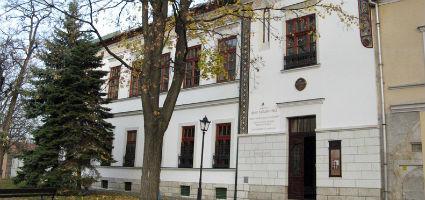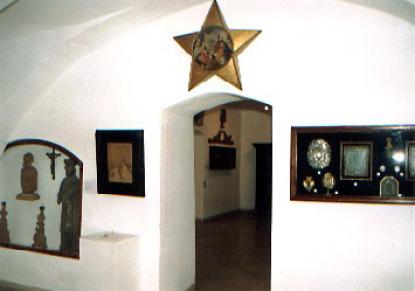2025. April 26. Saturday
The Roman-Catholic Ecclesiastical Collection in Sárospatak - Sárospatak
 |
Address: 3950, Sárospatak Szent Erzsébet utca 13.
Phone number: (47) 314-107
E-mail: spatak@enternet.hu
Opening hours: Tue-Sat 10-18
|
Museum tickets, service costs:
|
Ticket for adults
|
500 HUF
|
|
|
Ticket for students
|
300 HUF
|
|
|
Ticket for pensioners
|
300 HUF
|
The well-being of Hegyalja, which can be put down to the grape-growing and wine producing, resulted in rich church enteriours in the 18th century. The 19-20th deterioration of the area and the changes of the taste had an unfavourable effect on the baroque inheritance. Thanks to the collecting work of Antal Kuklay, the museum today keeps a rich collection of the baroque ecclesiastic arts and liturgical life.

The dissolution of some monk orders in 1950 also resulted in the destruction of significant relics. However, pictures of the Szikszó Social Mission and other important relics of the Sátoraljaújhely, Gödöllő and Jászóvár orders (liturgical costumes, etc.) were rescued from the destruction.
As a result of the liturgical innovation of the Second Council of Vatican a good number of devices and liturgical objects lost their function and were placed to the museum.
The important resources of the region historical work, the stories collected from the parishes, are listed among the most interested items of the museum. Two important documents of Zsigmond Rákóczi and György Rákóczi I. Transsylvanian monarchs also found their ways to the museum through donations. The collection also protects the artistic heritage of priest and poet István Demeter.
The exhibition can be seen in the Sárospatak Gallery, under 14 St. Elizabeth Road.

The dissolution of some monk orders in 1950 also resulted in the destruction of significant relics. However, pictures of the Szikszó Social Mission and other important relics of the Sátoraljaújhely, Gödöllő and Jászóvár orders (liturgical costumes, etc.) were rescued from the destruction.
As a result of the liturgical innovation of the Second Council of Vatican a good number of devices and liturgical objects lost their function and were placed to the museum.
The important resources of the region historical work, the stories collected from the parishes, are listed among the most interested items of the museum. Two important documents of Zsigmond Rákóczi and György Rákóczi I. Transsylvanian monarchs also found their ways to the museum through donations. The collection also protects the artistic heritage of priest and poet István Demeter.
The exhibition can be seen in the Sárospatak Gallery, under 14 St. Elizabeth Road.
